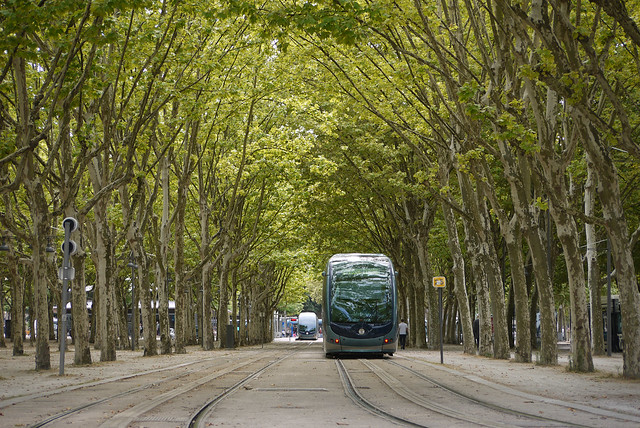

There is an extraordinary thing happening in France, the little villages are growing, not declining. More than a 1,000 villages this year will apply to be reclassified as towns based on the fact that their population now exceeds 2,000 people. It doesn’t surprise me because everywhere I travel I see signs of this resurgence and a strong attitude towards sustainability. The French are just bringing out an all electric car as I write called the Mia. Villages have ‘velo buses’ (bike buses) to collect children for school. Bike buses are regular, supervised routes school children travel in groups to ensure their safety.
The regional rail system (small town, small village) is being restored. This summer we took one of the new pilot services (exactly the same as Ottawa’s pilot light rail) from Nimes to the Mediterranean. It cost one euro and took about thirty minutes. Like the O-train, it blew out all the ridership predictions carrying more than 100,000 people in two months. The one euro ($150) ride is of course subsidized but the effect of fast, convenient cheap access to the sea for thousands is about more than moving people. It has a dynamic effect on the entire economy and society.
One of the big knocks on small village life is that it is isolated and isolating. Well if your children can get the train for a single Euro (fits in with most children’s allowance) and they and their friends can spend the day at the sea side, this helps change young parent’s attitude to living in a village. And it’s not just transportation, if country schools are as good as city schools that’s another reason to choose village life.
It’s not just the French, the town that I was staying in had more than 50 gites, (places owned by Brits, Americans and Canadians as second residences). One of my neighbours was a former American NFL football player with the Oakland Raiders. He was in the village for the same reason all the ex-pats were, the liked the life – the tranquility but also the liveliness of the markets, festivals, the quality of the food and wine, where local isn’t a new concept, but the way its always been done.
The difference between France and North America in this regard is striking. France has spent the last 25 years upgrading and expanding all of the services which make local and national life comfortable while in North America, the first commandments have been close down, reduce and privatize. The consequences of this are evident everywhere. Twenty-five years ago, the TGV did not serve all parts of the country, now it does. Twenty-five years ago, most cities didn’t have tramways, now they do everywhere. Bordeaux where I am presently staying has an exceptional one and now there’s country rail service.
To put it in a Canadian context, it’s as if all our major cities were connected by rapid rail and when you arrived ‘en ville’, there was a city tram way waiting at the door – which you have to ride to believe. Bordeaux new system is powered by underground wiring, is large, flexible and fast. If you wish to rent a car, you’ll find the French expressways are tolled, but are in much better shape than our largest roads. All of this local and national investment is not going to disappear if the recession deepens and world trade contracts. It will be there serving people, making life easier, more attractive and more successful.
photo by Anthony Abbot

3 comments
“Bordeaux new system is powered by underground wiring, is large, flexible and fast” and three times as expensive per kilometre, which is why it is not deployed in the entire system but rather in heritage or otherwise sensitive zones.
The only system deploying a full-wireless solution is Dubai, and even then this creates vendor lock-in to Alstom.
Maybe the former city councillor and failed mayoralty candidate Clive Doucet should consider living in France, where everything is obviously perfect. Why live in North America, where we get everything wrong?
PA: I would not blame Clive for thinking about living in France – the infrastructure sounds amazing.
But I take his points to be about the decisions most North American cities have made to bind themselves to failed economics of urban sprawl. I can’t find a lot to argue about with that.
By the looks of all the new downtown condo towers everyone is talking about, it looks like a lot of Ottawans are coming around to the sprawl-free lifestyle as well.